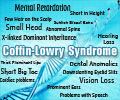Causes of Intellectual Disability
There are various causes of intellectual disability, but it is also known to occur as an isolated disability without any known cause.
Intellectual disability can result from any kind of damage to the brain or lack of oxygen supply to the brain. The condition can exist in isolation or can be one of the features of a birth defect or genetic condition. The most common causes of intellectual disability are:
Genetic conditions: Genetic and chromosomal disorders can cause intellectual disability, that co-exists with other problems and typical features. Some of the disorders associated with genetic anomalies are Down’s syndrome and fragile-X syndrome.
Prenatal Causes: Any kind of interference with the fetal brain development during pregnancy can cause developmental delays in the child. Some of the known causal factors include intake of alcohol, smoking, malnutrition in the mother during pregnancy. Conditions like preeclampsia and certain infections like rubella may also affect the fetal brain development.
Problems during birth: Oxygen deprivation during birth, breech birth, forceps delivery and other such conditions can cause physical injury to the tender cranial bones and may result in the developmental delays in the child.
Illness or injury during early childhood: Measles, mumps, meningitis and whooping cough may affect the development of the brain and result in intellectual disability. Severe head injury, allergic reactions to certain drugs, extreme malnutrition, exposure to toxic substances like lead, etc are the causal factors of the intellectual disability in early childhood. Sometimes, severe neglect or extreme abuse may also lead to this condition.
Metabolic disorders: Some of the metabolic disorders that are known to cause the condition are phenylketonuria, maple-syrup urine disease, hypothyroidism and glycine encephalopathy. Fortunately, metabolic disorders can be treated or managed if identified early, and resulting intellectual disability can be prevented.
Cranial anomalies: Conditions like microcephaly (small cranium), hydrocephalus (abnormal accumulation of the cerebrospinal fluid), macrocephaly (large cranium), etc may not only retard the development of the brain, but also result in visual impairment, convulsions, etc. These conditions can be managed medically to some extent.












